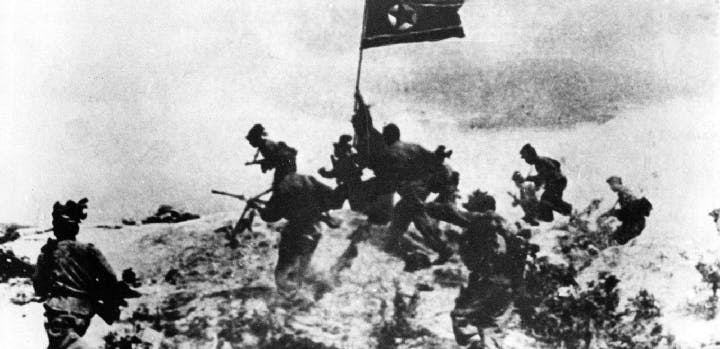Summer 2020
“May We Unfold the Radiant Fatherland!”
– Yee Rem Kim
How lost writings of North Korean soldiers challenge long-held notions of the war.
How can we forgive those who keep invading us, Those who turn our land red with blood?
The Korean War has grown more distant with the passage of seven decades. Yet the chasm between the two nations on the peninsula – created by a heart-wrenching history of violence, as brothers turned upon each other – remains a wide one, even today.
How can we close that divide? One way is to find and listen to the voices of those who fought in that terrible conflict. Each passing year leaves fewer survivors, but these memories are also recorded in oral histories and writings left behind by those no longer with us.
My own search for these first-person accounts of the Korean War led me to a unique archival collection in the National Archives and Records Administration in College Park, Maryland: Record Group 242 (RG 242).
In these documents, commonly known as the North Korean Captured Documents, I found a window to examine the conflict from the perspective of North Korean soldiers.
In the records of RG 242 we glimpse the intimate moments of of North Korean soldiers who do not view the enemy based on a North-South divide.
The personal writings in RG 242 – poems, letters, songs, and diary entries – were seized directly from North Korean soldiers during the conflict. And while they often lack key contextual information about their authors and their audience, they are of great significance. They add to our understanding of the war and allow these soldiers to speak to us directly again in their own words.
Having only read and heard about RG 242 during my undergraduate years, it was an eye-opening experience to see and touch these records left behind by those who fought the war. Poems with lines such as the one quoted above, titled “We March Forward and Forward We Go,” give history that is often rendered in black and white, vibrant new colors.
These documents connect us to the voices of the North Korean soldiers – men who were closest to the battlefields and saw the war unfold in front of their eyes as they were transformed by it.
Liberation Not Division
The Korean War narrative with which we are most familiar offers us a picture of a peninsula that was – as Sheila Miyoshi Jager observes in Brothers at War: The Unending Conflict in Korea – a landscape with a "deep and polarized ideological divide and decades of pent-up personal animosities" prior to the war. It is a view that not only foregrounds the Cold War elements of the story of the conflict and its aftermath, but also hardens the image of “the enemy” held by both governments.
In the records of RG 242 , however, we glimpse the intimate moments of of North Korean soldiers, who do not view the enemy based on a North-South divide. We also discover that the goals for which these troops were fighting may not have been as ideologically charged as we have come to believe, nor driven by grudge and malice.
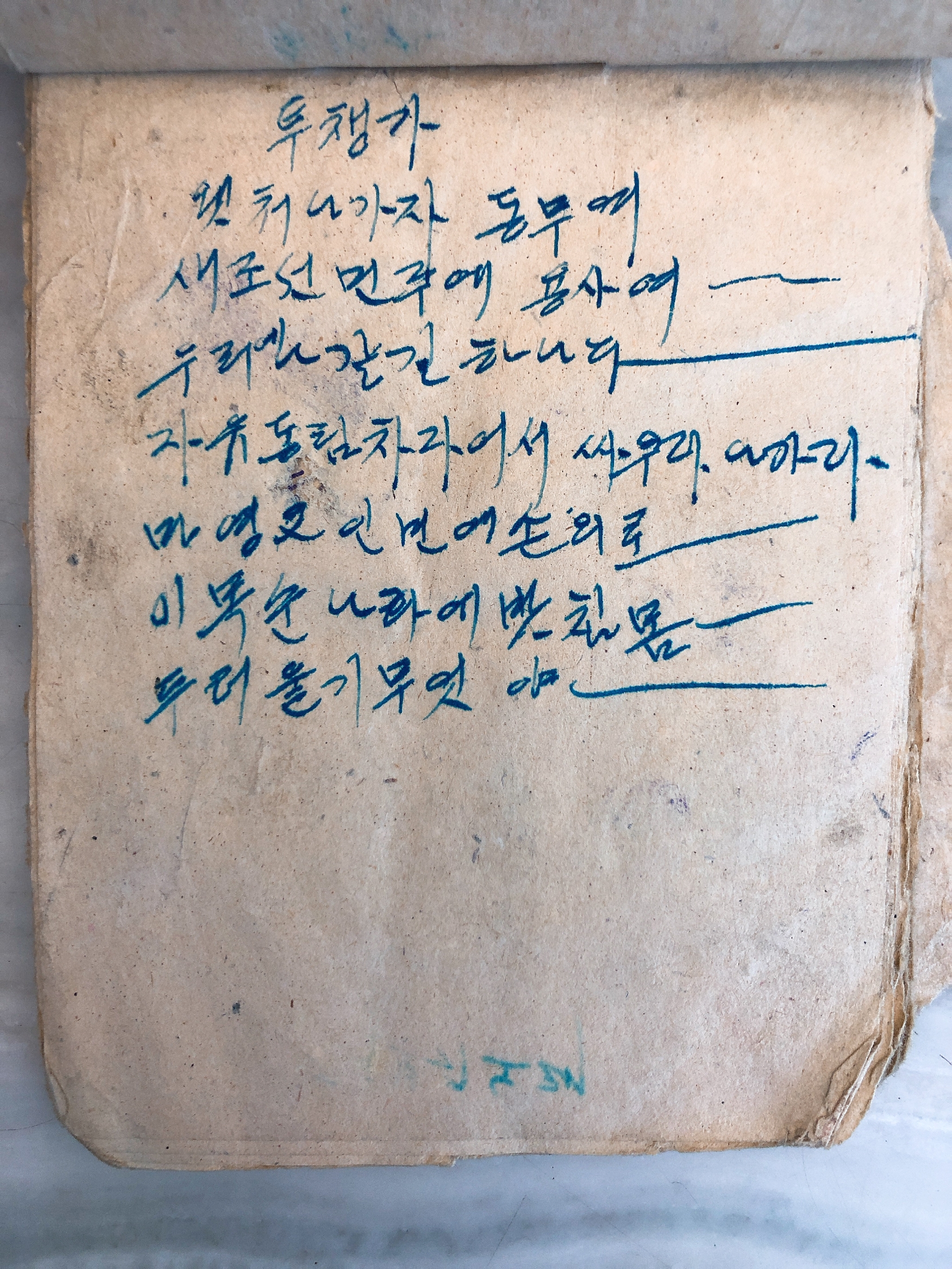
The years preceding the war saw Korea finally freed from the bondage of Japanese colonialism. But the peninsula’s occupation and subsequent partition by the American and the Soviet powers quickly clouded over the newly gained freedom.
As Bruce Cumings writes in his book, The Origins of the Korean War Vol. 1: Liberation and the Emergence of Separate Regimes, 1945-1947:
…[T]his consolidation a deux in north and south, however, came the end of the fertile and creative initiatives occasioned by the liberation, a cauterization of diverse forces, and the effective termination of the opportunity to create a truly independent country that, as Koreans at the time and since have noted, was both the gift and the challenge of liberation. To release Korea from Japanese monopoly only to lock it in a Soviet-American duopoly was to make a mockery of liberation and a hallucination of the unified republic that seemed to be emerging in August 1945.
Reading a poem such as “A Warrior's Song” in this context offers fresh insights on how Koreans saw the new divides of occupation. Liberation from Japanese colonialism symbolized a dawn of a new era for Korea. Yet this new dream of this liberated Korea was snatched away almost immediately.
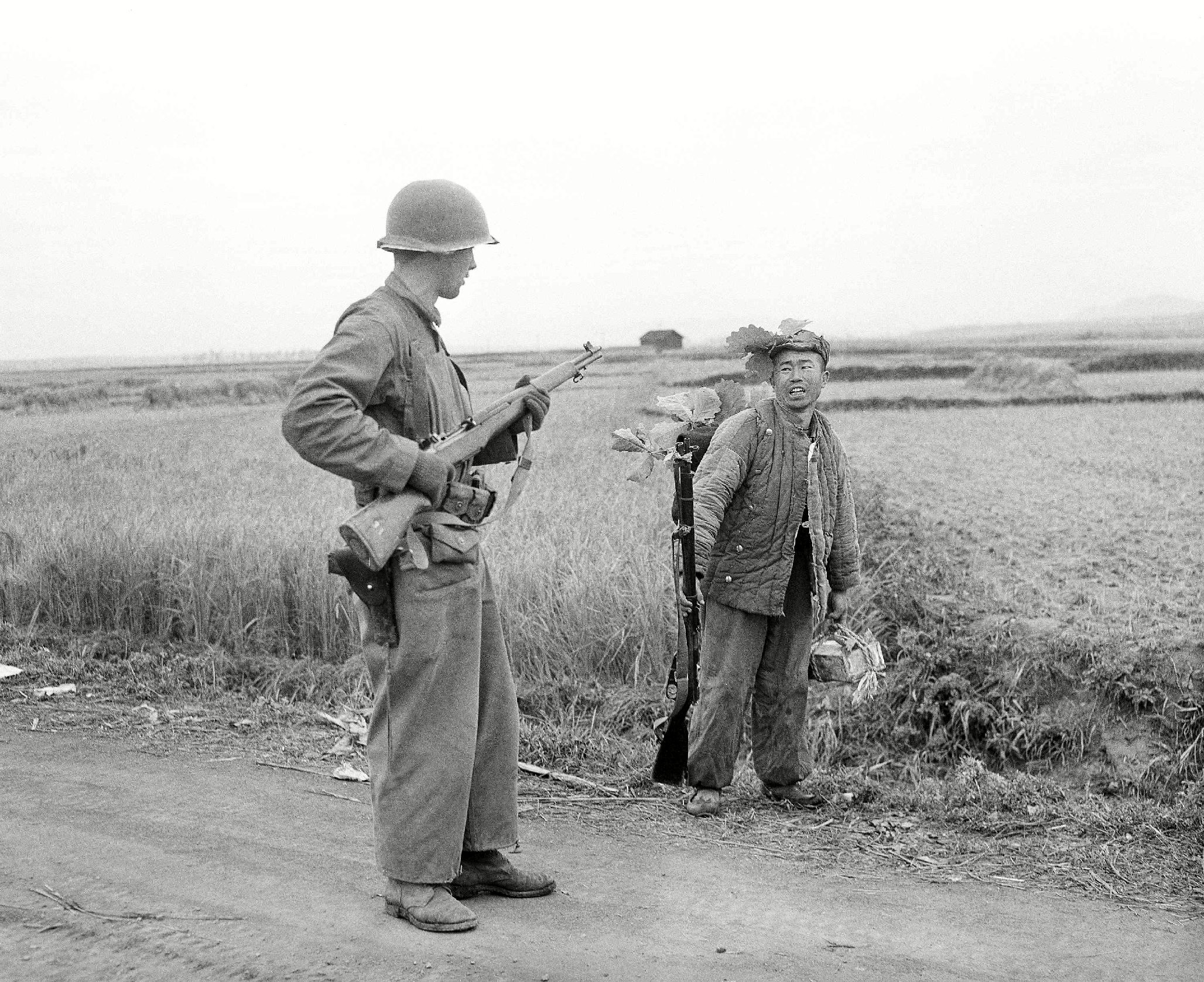
The writer of “A Warrior's Song” seeks that dream of complete liberation from all outside powers, without reference to ideology:
Let’s march forward with shouts, comrade. Warriors of New Korea’s democracy. There is only one path for us Fighting and marching in search of an independent liberation Horse reins into the hands of the people. What should I fear, For I’ve laid down my life for my country?
The author of “A Warrior's Song” deploys the image of a warrior pushing forward to lay down his life to complete an unfinished task. In the same notebook, this anonymous writer underscores this goal of liberation: “People, united as firm as steel/Risen for one cause only/We’ll bring complete liberation to our fatherland.”
The concept of liberation from external powers to develop a new Korean identity is present in other documents as well. A "People's Army Marching Song," found in separate notebooks in the archive (and likely circulated among the soldiers), begins with: "We, the Korean People's Army, are like steel/ Warriors fighting for justice and peace / We will vanquish our enemies/ And gain complete independence of the fatherland."
Who Is the Enemy?
The question of who these soldiers believed that they were fighting is as interesting as this goal of “complete liberation.” Who stands in the way of long-awaited independence? Who is denying it to the Korean people?
The Korean word wonsu – enemy – comes up frequently in many writings I examined in the archives, weaving a language of oppression and articulating a lurking presence of an enemy.
"We will conquer wonsu in the war of our guns and knives of justice/ And the people of the republic will prosper, rich and powerful," reads one poem in RG 242. Another poem puts it this way:
Pushing through the billows of the sea and driving the fleet We protect the sea of the fatherland Even if our country is far beyond these vast waves We always hear the summons of our country Fly high our flag of honor We will vanquish wonsu and protect these waters.
It is natural to assume that the wonsu in these writings refers to the South Korean government and its soldiers. But this is only partially correct. In one poem, “We March Forward and Forward We Go,” the enemy is explicitly described as those “who keep invading us” – a rhetoric often used to refer to the US imperialists:
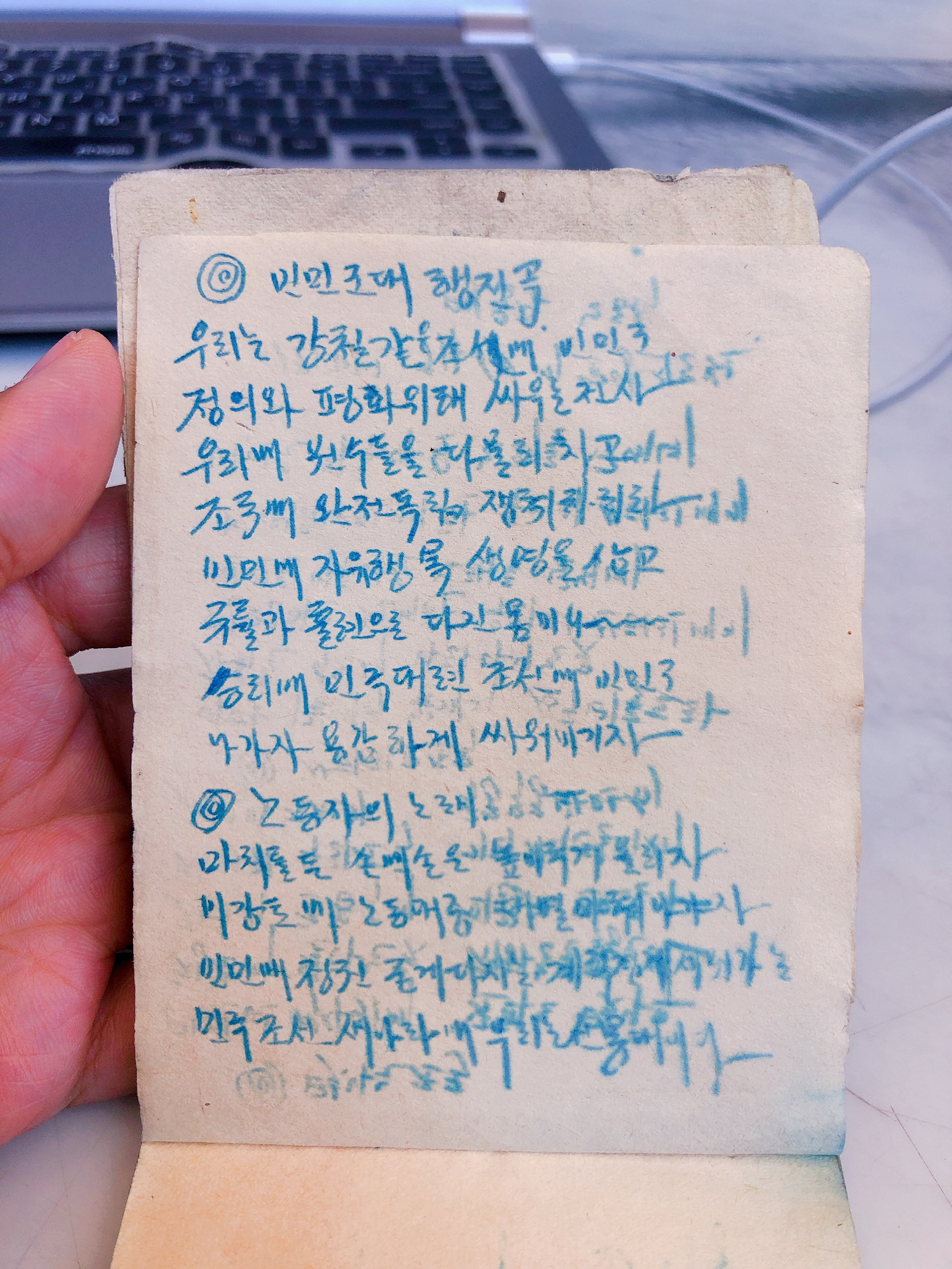
Marching forward. Forward. We march forward and forward we go. We march courageously, defeating our wonsu How can we forgive those who keep invading us, Those who turn our land red with blood? Force of justice, with our strength We will crush them and push forward.
The foreign nature of the enemy is also found in a letter titled “A Letter to Special Someone Far Away”:
We are the people’s sons and daughters [of the people’s republic] working hard daily and committing ourselves to diligent studies, trying to defeat the Americans and Rhee Syngman with his group of traitors in order to retrieve our territory and freedom in pursuit of a peaceful life.
The writer of this letter argues that liberation, which has been stolen away from them, must be retrieved from "the band of robbers" in "the fight for justice." Note that it is not the South Korean people who need to be defeated. Rather, U.S. forces and those working with them are the enemies who must be purged. And once this task is accomplished? Peace and happiness lie ahead of them.
Despite a seemingly inherent animosity between North and South Korea during the war, the definition of the enemy in these writings suggests a more fluid notion held by civilians and soldiers who prioritized the fate of a nation above any ideological and political chasms between the two states. In this view, foreign intervention in Korea is the common enemy and the source of misery for the people.
Clinging to Unity
Despite these fraternal sentiments, and partition was a fact both before the conflict and for the seven decades since the war began in 1950.
Yet as we have seen, the writings of these North Korean soldiers do not simply regurgitate the common narrative. Their view of the partition of Korea departs from present day understandings and assumptions about both history and current inter-Korean affairs.
Civil conflict is engraved into our ideas about the Korean War, which ultimately did result in two separate Koreas. But many writings in the archives do not mention a divided nation. Instead they often assert the unwavering patriotism these soldiers held for a single fatherland – as I have translated the word joguk – and for one Korea.
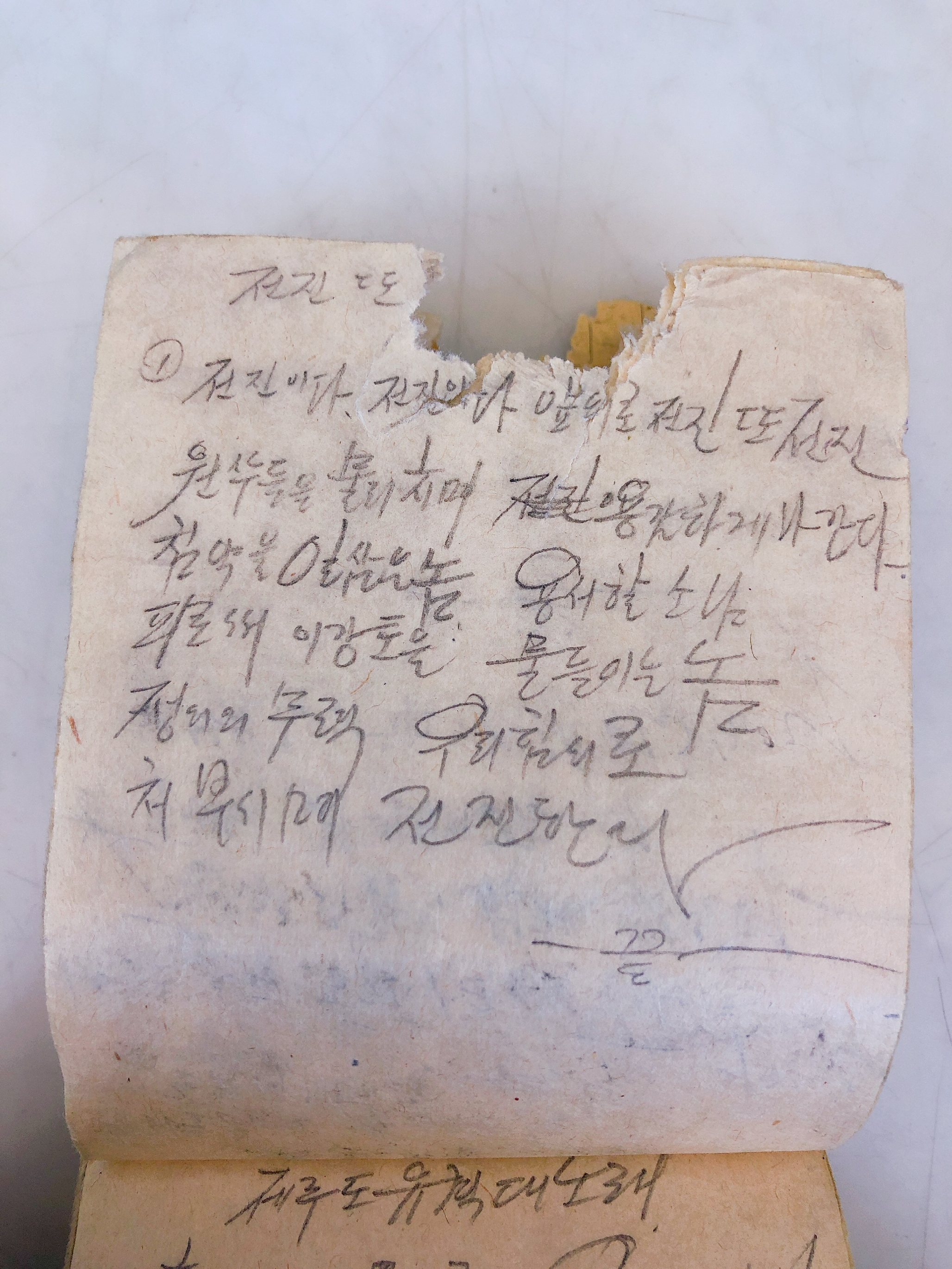
The repeated rhetoric in these documents concerning the fatherland portrays it as a single nation that must be liberated and protected with one’s life. The tragedy of a divided nation is nowhere to be found in these writings, though the task of full, complete, and independent liberation of Korea is both dominant and urgent. The fatherland of these documents comprises both the northern and southern parts of Korea.
One of the few documents in RG 242 that has a specific date is a poem titled “Splendid Fatherland” from September of 1950:
The culture that flourished With 5,000 year-long history Shines as brightly as in its creation, Piercing its light through the sky. Those whose blood boils in the Struggle to breathe in freedom. May we unfold the radiant fatherland! Korea! Korea! Long live, Korea!
This poem traces the history and culture of the fatherland back 5,000 years since its creation, and seeks to empower its people in their struggle for freedom. There is no trace of a divided nation in this poem, which instead envisions one glorious Korea, and elides any mention of unification by force.
This notion of “unification” is rare in these writings. "Letter to Unki," is one of the few pieces that uses the phrase “unification of the fatherland.” The author of the letter writes:
Here in Pyongyang… no matter who they are, everyone arms oneself with guns and knives and there is not a comrade who is not fighting…
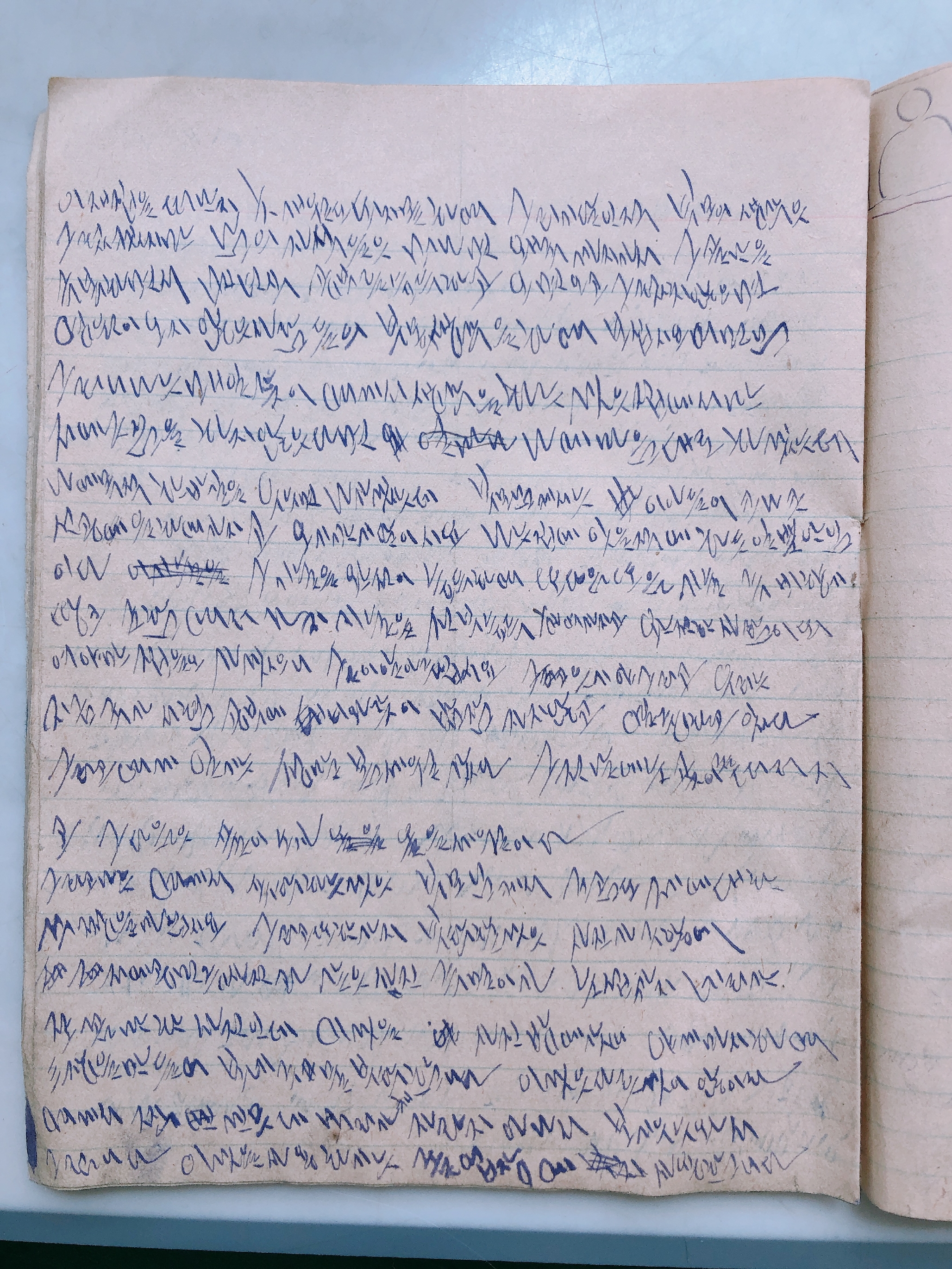
The unknown author continues:
Among us, student comrades, there are those who have complicated situation with family and have left their wives, sons, and daughters behind. Letters arrive daily telling them they have nothing to eat and nothing to wear. Even these comrades clench their teeth and study, determined not to return until the unification of the fatherland.
The writer of “Letter to Unki” acknowledges a division. But even here, war is not seen as a means to kill off a presumed enemy. It is instead a means to an end of attaining the reunification of Korea – a personal mission for everyone involved, and using every way they can contribute, to achieve a true, independent liberation as one nation.
The intimate personal writings in RG 242 give us a unique glimpse into the thoughts and feelings of North Korean soldiers. Their voices have been neglected and unheard for many decades. Yet the sentiments they articulate in these works challenge many of our preconceptions about the Korean War – and especially the notion that the war stemmed from inherent animosity between North and South Koreans. These poems, letters and diaries offer a glimpse of missed opportunities. They depict men who fought not for a division between brothers, but against foreign forces to liberate their fatherland.
The tragedy of a divided nation is nowhere to be found in these writings, though the task of full, complete, and independent liberation of Korea is both dominant and urgent.
"The weather these days is showing signs of spring,” observes the author of "Letter to Unki." “Snowflowers (meaning snow or snowflakes) would fall the day before and grass would melt and spring up the next day." The writer sees hope in the coming of spring amidst the war, and expresses hopes for a warm reconciliation of the two Koreas on Korean peninsula that continue to resonate today.
These captured writings are a valuable resource. Rather than further polarizing an already dichotomous rhetoric of the Korea War and its cause, the testimonies in these archives enrich our understanding of the war, and help us see all actors involved in the conflict as equals, and deserving of equal treatment and attention.
Yee Rem Kim is a graduate student in the History Department at the University of British Columbia. She has an undergraduate degree from Yonsei's Underwood International College in Seoul, South Korea. She was a Wilson Center Korea Foundation Junior Scholar in 2019.
All the materials in the Korean language from the National Archives and Records Administration have been translated into English by Yee Rem Kim.
(Cover photograph: North Korean troops advance during the Korean War. Korean Central News Agency/Korea News Service via AP Images)
